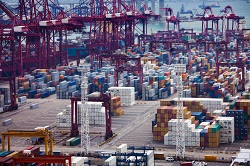Japan free zones in 2025
 Japan’s free trade zones are attractive options for business setups since they offer foreign companies partial tax exemption and partial custom duties exemption. The FTZ include: i) Okinawa SFTZ, optimal for semiconductor, circuit board and precision grind jigs production ii) Naha FTZ, optimal for business operating in manufacturing, cargo, ship building and import and export, and iii) Nigata Free Port, suitable for business in the sectors of sea freight, international distribution, energy and foreign trade.
Japan’s free trade zones are attractive options for business setups since they offer foreign companies partial tax exemption and partial custom duties exemption. The FTZ include: i) Okinawa SFTZ, optimal for semiconductor, circuit board and precision grind jigs production ii) Naha FTZ, optimal for business operating in manufacturing, cargo, ship building and import and export, and iii) Nigata Free Port, suitable for business in the sectors of sea freight, international distribution, energy and foreign trade.
Advantages of registering a company in one of Japan’s free trade zone
- Japanese free trade zones offer a variety of tax benefits.
- Companies incorporated within a Japanese FTZ are exempted from tariffs (up to 100%) and domestic consumption tax (up to 100%) for i) goods imported in the FTZ for manufacturing and ii) re-exported goods;
- For companies operating in Okinawa SFTZ, 30% of the income tax earned by companies is exempted from corporate tax for a period of 10 years;
- Furthermore, 15% of machinery and equipment costs and 6% of building costs are deductible for expanding their facilities;
- For companies operating under Naha FTZ, 40% of corporate income is exempted from income tax for the first 10 years after incorporation;
- Companies operating in the Niigata Free Port are exempted from real estate tax and corporate tax for a period of 3 years.
- All the Free Trade Zones are located next to ports and air terminals, facilitating logistics and lowering transportation costs.
Requirements of Japan’s free trade zone
- All of the Free Zones require the companies to follow the same requirements as the general rules of setting up a company in Japan: i) minimum share capital of US$50,000, ii) resident director and iii) rental of office space;
- In relation to Okinawa Special Free Trade Zone, the following specific requirements apply:
- Companies that are eligible for the income tax deduction under the Okinawa SFTZ are only companies engaged in i) manufacturing ii) packaging and iii) warehousing;
- In order to have access to further local tax benefits, the required minimum paid up capital is 10 million JPY.
Comparison between the free zones
| Summary at a glance | Okinawa SFTZ | Naha FTZ | Niigata Free Port |
|---|---|---|---|
| Average annual Industrial space rent per 1000 sqm | US$96,000 | US$90,000 | US$82,000 |
| How long to incorporate the company? | 5-6 weeks | 5-6 weeks | 5-6 weeks |
| How long to open company bank account? | 2 weeks | 2 weeks | 2 weeks |
| Quality of Utilities | Very Good | Good | Good |
| Allowed to sign sales contracts with Japanese Clients? | Yes | Yes | Yes |
| Allowed to invoice Japanese Clients? | Yes | Yes | Yes |
| Corporate tax payable in Japan | Dependent on activity | Dependent on activity | Dependent on activity |
| Corporate bank account | SCB or HSBC | SCB or HSBC | SCB or HSBC |
| Industrial space availability | Limited | Many | Many |
| Allowed to import raw materials? | Yes | Yes | Yes |
| Allowed to export goods? | Yes | Yes | Yes |
| Wholly foreign owned | Yes | Yes | Yes |
| Can the entity hire expatriate staff in Japan? | Yes | Yes | Yes |
| Do you visit Japan for company incorporation? | No | No | No |
| Minimum number of directors | 1 | 1 | 1 |
| Minimum number of shareholders | 1 | 1 | 1 |
| Tax registration certificate required | Yes | Yes | Yes |
| Individual shareholders allowed | Yes | Yes | Yes |
| Corporate shareholders allowed | Yes | Yes | Yes |
| Corporate director(s) allowed | Yes | Yes | Yes |
| Public register of shareholders and directors | Yes | Yes | Yes |
| LLC company allowed | Yes | Yes | Yes |
| Can apply for immigration visas | Yes | Yes | Yes |
| Annual audited financial statements | Yes | Yes | Yes |

